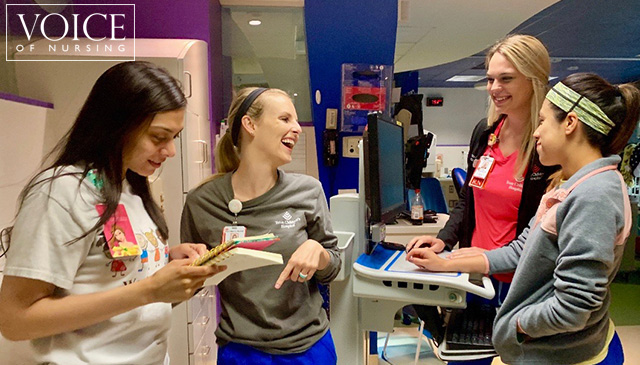
Lauren Stombaugh shares how her positive, patient experience with her care team at Texas Children’s 10 years ago inspired her to return to Texas Children’s to begin her nursing career. More

Lauren Stombaugh shares how her positive, patient experience with her care team at Texas Children’s 10 years ago inspired her to return to Texas Children’s to begin her nursing career. More
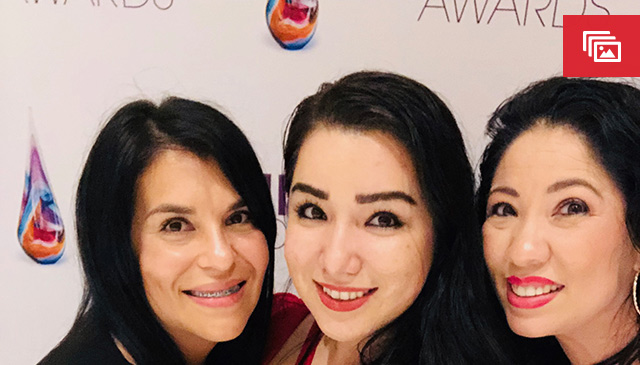
Texas Children’s own Joselin Martinez, senior administrative coordinator to the Pediatric Department of Neurosurgery, was recently honored at The Admin Awards® Gala at the Houston Post Oak Hotel on May 22.
Sometimes referred to as the “Academy Awards for Admins,” The Admin Awards® is the first and only public recognition program of its kind in the nation that specifically honors the achievements, dedication and importance of administrative professionals. Individuals are recognized across several categories – such as Office Management, Company Loyalty, Spirit and Rookie of the Year – at celebrations in seven U.S. cities, including San Francisco, Denver, Chicago and Houston. The winners are chosen by an independent panel of judges from a pool of hundreds of nominees.
Martinez received the Administrative Excellence in Healthcare Award, presented to an individual who effectively serves and exhibits excellence in the health care industry.
“I was very happy and excited to have been nominated and my application selected from hundreds of applications in the Houston area,” said Martinez. “I never thought I would make it to the final round of nominees, let alone be the winner! To receive such an award with my name engraved in it, and the amazing company that I work for meant so much.”
She was nominated by Texas Children’s Director of Neurosurgery Oncology Dr. Guillermo Aldave, Chief of Neurosurgery Dr. Howard Weiner and Epilepsy program coordinator, Georgina Cedillo.
“Ms. Martinez is outstanding in every way and I could not carry out the many critical functions of my job without the continuous, tremendous expertise she brings to our team every day,” said Weiner. “I am struck by her ambition, drive, intelligence, independence and the manner with which she carries herself – always with great courtesy and a pleasant demeanor, despite the stressful nature of her work. She is clearly headed for greater heights of success.”
In addition to numerous support responsibilities, Martinez also serves as academic coordinator for the Division of Neurosurgery’s resident and fellowship program.
“Joselin is one of the reasons why our department is so highly regarded among other institutions, especially when it comes to her performance as direct coordinator for the academic part of our residency and fellowship program,” said Aldave. “We consistently receive positive feedback from applicants from all over the country about how efficiently and well-organized their time at Texas Children’s is. Joselin is responsible for that incredible first impression.”
Martinez is also is a current member of the American College of Healthcare Executives and an active member of the Medical Group Management Association. She holds a dual master’s degree in Healthcare and Business Administration, as well as certifications in medical office management and Lean Six Sigma.
“My work in the department of Neurosurgery has been nothing but fulfilling in every way,” Martinez said. “Texas Children’s Hospital opened the opportunity for me to be a part of a tremendously focused team that values each and every one of their staff. Being a part of this team has been nothing but spectacular in every way, and I am motivated now more than ever to be the best I can be for Texas Children’s Department of Pediatric Neurosurgery.”
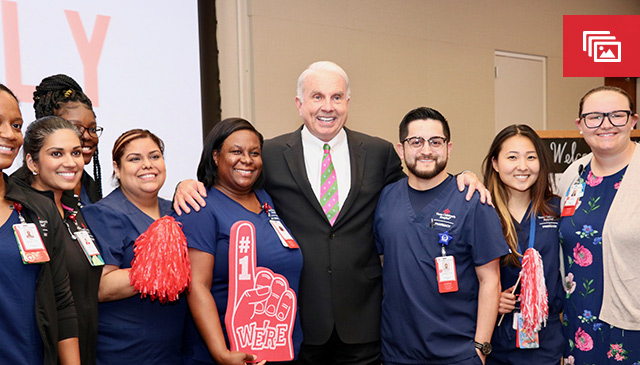
The Mark A. Wallace New Employee Pep Rally allows new employees to learn more about the organization and meet executives and other leaders within a festive atmosphere complete with foam fingers, pompoms and lively music. Participants included new and recent hires based at the Medical Center. The pep rally was held on June 3 at the Pavilion for Women Conference Center.
“We are flourishing and we’re blessed to have all of you here,” President and CEO Mark Wallace told the new employees, recalling Texas Children’s early days in a single, seven-floor building – well before the opening of Legacy Tower at the Medical Center campus; the suburban hospitals at West and The Woodlands; and the urgent care centers and specialty care clinics that stretch across Harris County and now reach into Austin and Central Texas.
“In 1989, I knew this was our destiny,” Wallace said. “I knew Texas Children’s was going to grow and flourish because that was part of the plan: taking care of more patients and more families. The key to our success has always been the people and the leadership.”
Wallace also introduced himself and shook hands with every new employee at the pep rally, pausing often to pose for photos and snap selfies.
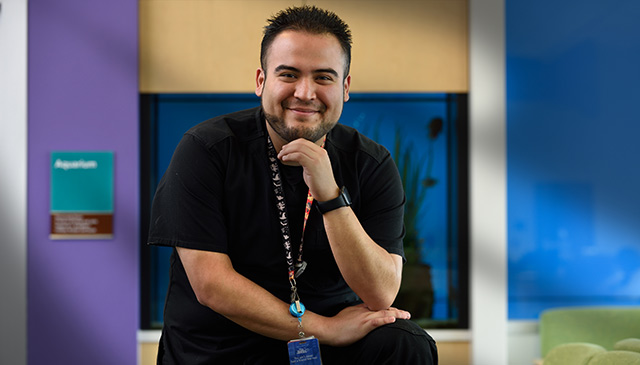
Many people hope to be able to work in their preferred career upon graduation, while others may just want to work at their desired workplace with the goal of moving towards that career. Juan Flores, Radiology Generalist at The Woodlands Campus, as successfully done both very early in his career and can add a system-wide award to that list.
“This is amazing! I just graduated a little over a year ago, so working here is kind of like a dream come true,” Flores said. “I never thought I’d work at Texas Children’s until maybe later on, until I have more experience, but I took a chance so I’m happy about that.”
Flores is known to be very quick to volunteer outside of his role as a radiographer. He is on the Radiology Events and Activities Committee, he has played a role in several simulations inside and outside of Radiology, he is a part of the Customer Obsession Task Force, and helps with The Teddy Bear Clinic.
When his youthful presence is removed, Flores can be mistaken for a Texas Children’s veteran even though his has only been here a year, as his work constantly exemplifies our mission.
“In such a short time, Juan has been a fantastic addition to our team! He takes his role as a radiographer seriously and puts forth 110 percent every day,” Assistant Director of Radiology Traci Foster said. “Regardless of the day he’s having, Juan is always positive and has a great sense of humor.”
Foster recalled a time when a 4-year-old in the orthopedic clinic had a fractured arm and needed an x-ray. She says that the child was extremely anxious due to a recent, difficult, experience at an outside urgent care.
“Juan worked with the mother of the patient to identify a comfort position for the child. He was extremely patient and allowed them time to warm up to the environment by showing them the big camera and allowing the patient to touch and explore the room and equipment prior to positioning him for the x-ray,” Foster said. “The child was very receptive to his gentle approach and was able to complete the x-ray while smiling and saying ‘cheese.’ The mother was so appreciative of Juan and so are we. The entire department thanks Juan for going above and beyond to create a great patient experience for all of our patient families.”
At times after a hard day of work, when an emergency occurs there aren’t many people who will volunteer for additional duties. Flores’ hard work, determination, and persistence are all of the reasons why he is one of this year’s Caught You Caring Award recipients.
“I was so surprised when I found out that I won this award. “The fact that I’ve only been here a short while, and I work with so many other amazing people, this was really unexpected,” Flores said. “I love it here. It’s a tough job, but it’s extremely rewarding, and I hope to continue here for years to come.”
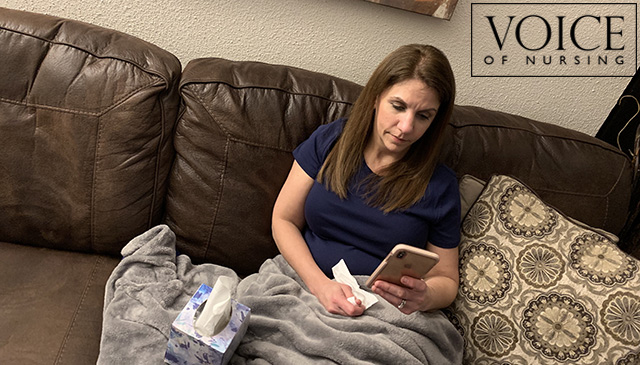
Denine Moody shares her experience using Cigna Telehealth, a new benefit that allows employees who are enrolled in a Texas Children’s medical plan, to connect with a doctor for consultation right from their smartphone. More
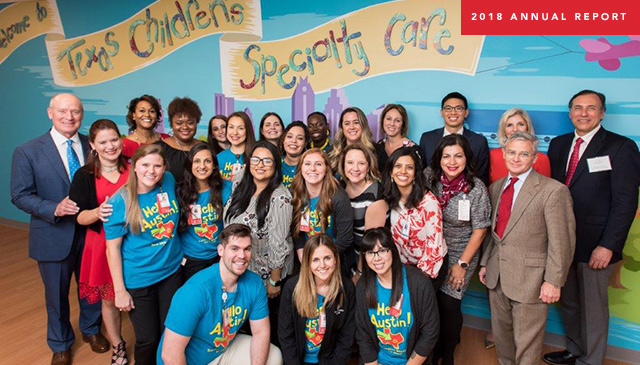
Texas Children’s marked the beginning of an exciting chapter in its history last year by opening the first Austin location, Texas Children’s Urgent Care Westgate. Since then, Texas Children’s Pediatrics primary care and Texas Children’s Specialty Care Austin have been introduced to the Austin community with a pediatric population of half a million. Learn more by visiting our 2018 virtual Annual Report.
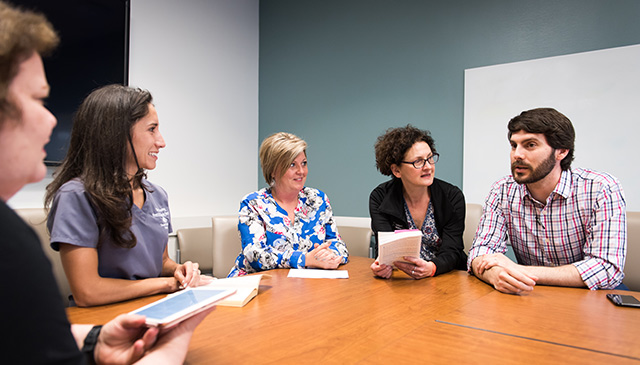
Being a clinician in today’s fast-paced health care environment can be stressful. The expectation to see more patients and produce better, quicker results stretches the limits of even the best care givers in the field. As a result, a level of compassion and empathy can be lost, which in turn can impact the quality of care given to patients and their loved ones.
Texas Children’s nurtures compassionate, empathetic, humanistic relationships between clinicians and patients. To better support care givers in creating and sustaining these types of relationships, Dr. Daniel Mahoney, a palliative care physician, and Dr. Gwen Erkonen with the Pediatric Intensive Care Unit have created a Medical Humanities Program at Texas Children’s for Texas Children’s faculty and staff.
In affect for less than a year, the program works to incorporate humanities such as literature, philosophy, ethics, sociology, visual and performing arts into medical education and practice. What this has looked like thus far, has been opportunities for care givers to participate in music therapy sessions and book clubs geared toward clinicians. The program also is working to teach and implement narrative medicine and parallel charting.
“Our hope is the tools provided through this program will help clinicians better process the myriad of experiences they deal with on a daily basis,” Mahoney said. “As a result, we hope it will enhance the way we practice medicine.”
Dr. Amanda Ruth, a PICU physician, attended one of the program’s recent book clubs and said she got a lot out of it. The book, When Breath Becomes Air by Dr. Paul Kalanithi, was about a physician diagnosed with Stage 4 lung cancer.
Ruth, who deals with terminally ill patients often, said the book was interesting because it illustrated how a physician dealt with his own mortality and what it taught him about his patients and his role in caring for them.
“If you don’t connect with a family, you can’t really create an effective treatment plan,” Ruth said. “The more you understand their situation, the better able you are to care for them.”
Ruth added that she also enjoyed meeting care givers across the organization and simply unplugging from her daily medical duties, even if it’s just for a short time.
“It’s nice to not think about medicine for five minutes, to just get away and be human,” she said.
Another tool clinicians are learning through the Medical Humanities Program, is parallel charting. Some Texas Children’s residents are using parallel charting to help them implement narrative medicine into their everyday practice. When using parallel charting, residents keep two charts for each patient. One chart is to log the patient’s medical record. The other chart is to log how the patient and their experience is affecting the resident.
“Every patient and clinician has a story,” Dr. Daniel Mahoney said. “Narrative medicine teaches clinicians to pay attention to those stories and how they intersect to help cultivate a more impactful relationship.”
Dr. Daniella Saydi, a pediatric resident, said she used parallel charting during a four-week trip to Malawi and that it allowed her to think about her experience on a deeper level.
“It’s very easy to go abroad and live in the moment without actually meditating on what is going on around you,” she said. “Parallel charting allowed me to capture moments that I had forgotten about in the hustle of the work day. I can still vividly remember certain patients and details because I was able to write them down.”
Pediatric Resident Victoria Mitre is learning about narrative medicine from Mahoney and Erkonen as a member of the Primary Care Leaders Evaluating and Addressing Disparities program. Mitre said the quarterly class has helped her create a more purposeful framework for her writing and that it has driven home her longstanding belief that effective communication is perhaps the most important part of a pediatrician’s job.
“Whether it is walking into a patient’s room or starting the process of writing an Op-Ed, Dr. Efkonen and Dr. Mahoney have taught me the importance of first identifying and understanding my audience,” she said. “In clinical situations, this has helped me tailor my counseling to meet the specific needs of my patients and their families. When the work I can accomplish in clinic is simply not enough to meet their needs, narrative medicine has given me the space and tools to reflect on my experience and advocate for change. Ultimately, it has helped me take better care of myself as a physician.”
Erkonen, who studied professional burnout in the healthcare industry, said staying in touch with your emotions and connected to your patients and colleagues helps clinicians maintain meaning in their work and thus prevents burnout.
“Clinicians view a lot of tragic things, and as a result, it’s easy to let cynicism in,” Erkonen said. “That’s why staying connected is so important. It’s key to avoiding burnout.”
Burnout, Erkonen said, is something many care givers experience at some point in their career. If it’s not remedied, burnout can lead to an increase in clinician errors among other things that impede patient care and physician growth.
A robust medical humanities program that offers training throughout all levels of a clinician’s career can help prevent burnout and promote the development of a more engaged, fulfilled and empathetic clinical workforce, Erkonen said.
“If you don’t teach empathy, it won’t be cultivated,” Erkonen said. “It’s just as valuable as anything else you learn in medical school.”
For more information about the Medical Humanities Program at Texas Children’s, click here to view their page on Connect, and click here to see their page on texaschildrens.org. You also can follow the program on Twitter @TCHMedHum.